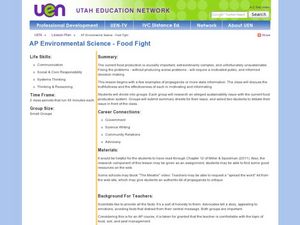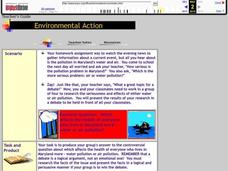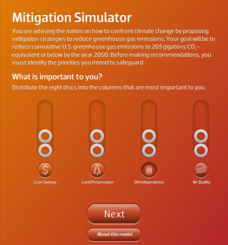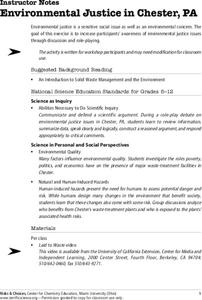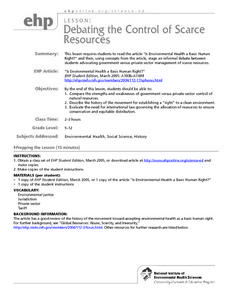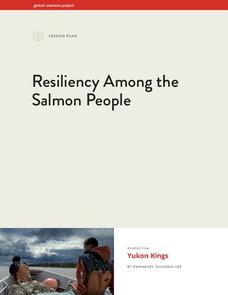Curated OER
AP Environmental Science-Food Fight
The content in this lesson is of a controversial nature. Please review to make sure it is suitable for your class. A video, The Meatrix is shown to the class, and then they discuss the emotionally-charged language that it uses. They are...
American Chemical Society
Hosting a Chemistry Debate
A debate is a forum for discussing controversial topics and environmental chemistry definitely fits that category. The lesson provides everything necessary to run a mini debate tournament. Use the suggested topics or come up with some as...
Population Connection
Lessons From the Lorax
Is progress progressing too fast? So believes the Lorax, the eponymous character from Dr. Seuss's The Lorax. Young environmental science students read the book and debate the arguments of the Lorax and the Once-ler regarding the...
Carnegie Mellon University
Debate
Set your environmental studies class up to debate a current topic regarding your choice of six suggested statements about energy use in the United States. Teams read material that you have gathered and then form their arguments. The...
Channel Islands Film
Restoration Channel Islands Debate
Introduce learners to the debate format with an activity that uses the National Park Service's controversial Channel Islands restoration program as a topic. Class members learn how to generate provocative debate questions, how to prepare...
Cornell University
Fibers, Dyes, and the Environment
Nanofibers can be made through electrospinning or force spinning in order to reduce the negative impact on the environment. Pupils study the role of fibers and dye on the environment through a series of five hands-on activities. Then,...
Curated OER
Environmental Action
Middle schoolers debate one another. In this pollution activity, pupils work in teams to debate which is more serious, air or water pollution. They research their topic to come up with valid points to justify their side of the debate.
Curated OER
Fracking: Positive or Negative Impact?
Your teenagers may have heard of fracking, but do they really know what it is? And could they debate the benefits and risks? Educate your environmental science class with a lesson about hydraulic fracturing, non-renewable energy...
National Academy of Sciences
Mitigation Simulator
The United States has more per capita emissions than any other country in the world. An eye-opening simulation encourages users to explore environmental goals and factors that affect climate change by balancing different priorities....
DocsTeach
Environmental Case Study: Hetch Hetchy Valley
What is more important: building a new school or preserving a nature reserve? Keeping a natural area clean or providing clean drinking water to a city of millions? Young scholars weigh these questions—almost literally—using an...
Curated OER
Environmental Justice in Chester, PA
Over several days, learners communicate and defend an argument regarding environmental justice issues in Chester, PA. After discussing the issue and viewing a video about the location of several toxic waste facilities in Chester, they...
Curated OER
Debating Controversial Issues: Integrating Science and Current Events
In order to give young scientists experience with critical thinking skills, introduce them to a current controversy and prepare them to debate. Choose a topic, such as genetically modified organisms, and assign groups to represent...
National Library of Medicine
Your Environment, Your Health: The Great Debate—Bottled Water vs. Tap Water in Our School
Should bottled water be sold in schools, or should they only provide tap water? The summative unit in the six-part series encourages scholars debating this topic. The lessons teach how to build an argument, how to gain background...
Curated OER
Global Warming and Hurricanes: Is an Increase in the Number of Stronger Hurricanes an Indicator of Global Warming
Ninth graders investigate whether stronger hurricanes are signs of global warming. In this environmental science instructional activity, 9th graders research both sides of the issue about global warming. They debate for or against this...
Curated OER
Hedgerows
Hedgerows prevent soil erosion, capture pollutants running off fields, store carbon to help combat climate change, and provide homes for predators of many pest species. The biodiversity lesson begins with an activity that...
Curated OER
Transportation Fuels Debate
Students study the different transportation fuels. In this energy sources lesson plan students debate the merits of their fuel over others while working together in groups.
Advocates for Human Rights
The Right to a Clean Environment in the United States
Even if a school has gone digital, chances are there's still plenty of paper being used. The three activities help scholars learn about the environmental impact of paper and another consumer products of their choosing, the issue of...
Curated OER
Environmental Agents of Mathematics: Mathematics for Change
High schoolers analyze environmental science data using Math. They do research about renewable energy, gather data, create graphs and interpret their findings. Then the group presents their arguments persuasively using their findings to...
Curated OER
Biodiversity Debate - Stream Side Science
Role play community members who are both for and against the construction of a dam. Research the pros and cons and then hold a classroom debate. This activity ideally follows a series of stream studies, links to which are included. Use...
Curated OER
Shasta Dam: How High is Too High?
Research water use in California, environmental protection laws, and the proposition to raise Shasta Dam by 200 feet. Researchers use their findings to build an argument which will be presented at a mock decision panel. Groups then...
Curated OER
Debating the Control of Scarce Resources
High schoolers examine the issue of government versus private sector control of natural resources. They read an article, evaluate the need for international law governing resource allocation, and participate in a class debate.
Global Oneness Project
Resiliency Among the Salmon People
Is losing cultural traditions the cost of social progress, or should people make stronger efforts to preserve these traditions? High schoolers watch a short film about the native Yup'ik people in Alaska and how they handle the shifts in...
National Energy Education Development Project
Great Energy Debate
If someone yelled for eight years and eight months, they could produce enough energy to heat one cup of coffee. A lesson on energy encourages scholars to research 10 different energy sources in groups before playing a game. Twenty...
Curated OER
Changing Planet: Infectious Diseases Classroom Activity
Here is a different approach: emerging epidemiologists first go home to interview family on the topic of infectious disease. Then they come to class and view a video and PowerPoint that explore how climate change may increase the...


